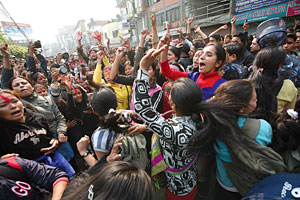 |
For the past week Kathmandu has been rent with the beat of drums, revolutionary songs, speeches and slogans around college campuses. There were banners everywhere, the streets were littered with student union pamphlets.
Students came out in large numbers to listen, talk and understand the process, using acronyms such as ANNISU, NSU and ANNISU-R quite comfortably. The elections were finally held on Thursday.
Historically, students unions were formed in Nepal as a form of resistance against the Panchayat system and worked with the people in the democratic struggle to overthrow it. The NC-affiliated Nepal Student Union's roots go back to 1971. The UML-affiliation All Nepal National Free Student Union was started in 1965 and has survived many splits and alliances over the years.
Young students who were leaders in the 1970s and 80s went on to become powerful party leaders. Sher Bahadur Deuba, Govinda Raj Joshi, Ram Chandra Poudel all emerged from student politics. Student union elections is where future politicians cut their teeth.
Senior political party leaders exploit the young students to extend their party's reach. During a banda, it is the affiliated student union that is mobilised to make the strike 'effective'. So powerful are the student unions that they can close down colleges, postpone exams and re-schedule sessions. For a political party, students are effective cadres: they have hope, they believe in radical change, they are creative, restless and highly ambitious. Classes may not run in colleges, schools may shut down for days, but there is always some political mileage to be made.
"It is easy to think that revolution is more important, and education can wait when you don't have to worry about where the next meal is coming from," says a former student union leader in the 1990s.
While travelling in Nepal, one is constantly amazed at how politically-aware young Nepalis are. For a country of young people, that is a very positive thing. But there's a difference between being a 17-year old politically-aware kid and actually getting involved in politics when you are 17 years old. But politics in government colleges is the main reason why more Nepalis who can afford opt for private colleges or go abroad.
From reading the interviews of the student leaders in past week's papers it is clear that the platforms of the student unions are photocopies of the manifestos of their parent parties. Student unions have played an important role in the past uprisings and in bringing changes to the country. The struggle for democracy is never over. But there comes a time when one has to move on.
Thursday's student union elections resembled last April's constituent assembly elections. The Maoist-affiliated student union is contesting for the first time, so student politics mirrors national politics. Since last week, all student unions have been padding up the numbers in colleges and universities with enrollments. Rumours are rife that Maoists from the cantonments have been enrolled en-masse in the campuses, some with fake certificates.
On Thursday, the Maoists disrupted elections in college where they were sure to lose, like Padma Kanya. Elections were smooth in places where the Maoist union is sure to win. However, reports of one person killed in Jhapa and over 50 beaten up all over Nepal trickled in during press time on Thursday. Maoists with red YCL bandanas formed a cordon at Bag Bajar to prevent polling from taking place, while students affiliated with the NC screamed in protest.
So, like the constituent assembly elections, it will be no surprise who comes out on top.



